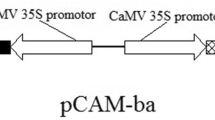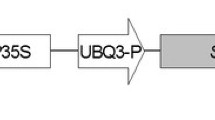Abstract.
Transgenic lines of indica rice were generated by Agrobacterium-mediated transformation with the choline oxidase (codA) gene from Arthrobacter globiformis. Choline oxidase catalyses conversion of choline to glycine betaine. Glycine betaine is known to provide tolerance against a variety of stresses. Molecular analyses of seven independent transgenic lines as performed by Southern, Northern and Western hybridization revealed integration and expression of the transgene as well as inheritance in the progeny plants. A good correlation was observed between levels of mRNA and protein accumulation, and a significant amount of choline oxidase product, i.e. glycine betaine, accumulated in R0 as well as R1 plants. Mendelian as well as non-Mendelian segregation patterns were obtained in the progeny plants. Challenge studies performed with R1 plants by exposure to salt stress (0.15 M NaCl) for 1 week, followed by a recovery period, revealed that in some cases more than 50% of the transgenic plants could survive salt stress and set seed whereas wild-type plants failed to recover.
Similar content being viewed by others
Author information
Authors and Affiliations
Additional information
Electronic Publication
Rights and permissions
About this article
Cite this article
Mohanty, .A., Kathuria, .H., Ferjani, .A. et al. Transgenics of an elite indica rice variety Pusa Basmati 1 harbouring the codA gene are highly tolerant to salt stress. Theor Appl Genet 106, 51–57 (2002). https://doi.org/10.1007/s00122-002-1063-5
Received:
Accepted:
Issue Date:
DOI: https://doi.org/10.1007/s00122-002-1063-5




